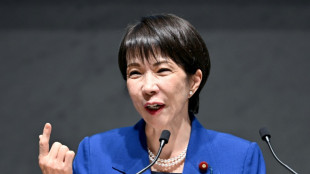
-
 The Cure guitarist and keyboard player Perry Bamonte dies aged 65
The Cure guitarist and keyboard player Perry Bamonte dies aged 65
-
Draper to miss Australian Open

-
 Police arrest suspect after man stabs 3 women in Paris metro
Police arrest suspect after man stabs 3 women in Paris metro
-
Former Montpellier coach Gasset dies at 72

-
 Trump's Christmas gospel: bombs, blessings and blame
Trump's Christmas gospel: bombs, blessings and blame
-
Russia lashes out at Zelensky ahead of new Trump meeting on Ukraine plan

-
 Salah helps Egypt beat South Africa and book last-16 place
Salah helps Egypt beat South Africa and book last-16 place
-
Australia's Ikitau facing lengthy lay-off after shoulder injury

-
 Another 1,100 refugees cross into Mauritania from Mali: UN
Another 1,100 refugees cross into Mauritania from Mali: UN
-
Guardiola proud of Man City players' response to weighty issues

-
 Deadly blast hits mosque in Alawite area of Syria's Homs
Deadly blast hits mosque in Alawite area of Syria's Homs
-
The Jukebox Man on song as Redknapp records 'dream' King George win

-
 Liverpool boss Slot says Ekitike reaping rewards for greater physicality
Liverpool boss Slot says Ekitike reaping rewards for greater physicality
-
Judge jails ex-Malaysian PM Najib for 15 more years after new graft conviction

-
 Musona rescues Zimbabwe in AFCON draw with Angola
Musona rescues Zimbabwe in AFCON draw with Angola
-
Zelensky to meet Trump in Florida on Sunday

-
 'Personality' the key for Celtic boss Nancy when it comes to new signings
'Personality' the key for Celtic boss Nancy when it comes to new signings
-
Arteta eager to avoid repeat of Rice red card against Brighton

-
 Nigeria signals more strikes likely in 'joint' US operations
Nigeria signals more strikes likely in 'joint' US operations
-
Malaysia's former PM Najib convicted in 1MDB graft trial

-
 Elusive wild cat feared extinct rediscovered in Thailand
Elusive wild cat feared extinct rediscovered in Thailand
-
Japan govt approves record budget, including for defence

-
 Seoul to ease access to North Korean newspaper
Seoul to ease access to North Korean newspaper
-
History-maker Tongue wants more of the same from England attack

-
 Australia lead England by 46 after 20 wickets fall on crazy day at MCG
Australia lead England by 46 after 20 wickets fall on crazy day at MCG
-
Asia markets edge up as precious metals surge

-
 Twenty wickets fall on day one as Australia gain edge in 4th Ashes Test
Twenty wickets fall on day one as Australia gain edge in 4th Ashes Test
-
'No winner': Kosovo snap poll unlikely to end damaging deadlock

-
 Culture being strangled by Kosovo's political crisis
Culture being strangled by Kosovo's political crisis
-
Main contenders in Kosovo's snap election

-
 Australia all out for 152 as England take charge of 4th Ashes Test
Australia all out for 152 as England take charge of 4th Ashes Test
-
Boys recount 'torment' at hands of armed rebels in DR Congo

-
 Inside Chernobyl, Ukraine scrambles to repair radiation shield
Inside Chernobyl, Ukraine scrambles to repair radiation shield
-
Bondi victims honoured as Sydney-Hobart race sets sail

-
 North Korea's Kim orders factories to make more missiles in 2026
North Korea's Kim orders factories to make more missiles in 2026
-
Palladino's Atalanta on the up as Serie A leaders Inter visit

-
 Hooked on the claw: how crane games conquered Japan's arcades
Hooked on the claw: how crane games conquered Japan's arcades
-
Shanghai's elderly waltz back to the past at lunchtime dance halls

-
 Japan govt approves record 122 trillion yen budget
Japan govt approves record 122 trillion yen budget
-
US launches Christmas Day strikes on IS targets in Nigeria

-
 Australia reeling on 72-4 at lunch as England strike in 4th Ashes Test
Australia reeling on 72-4 at lunch as England strike in 4th Ashes Test
-
Too hot to handle? Searing heat looming over 2026 World Cup

-
 Packers clinch NFL playoff spot as Lions lose to Vikings
Packers clinch NFL playoff spot as Lions lose to Vikings
-
Guinea's presidential candidates hold final rallies before Sunday's vote

-
 TGI Solar Power Group Inc. and Genesys Info X Announce Strategic Partnership to Launch FUSED88.com, a Next-Generation AI & ASI Driven Management Platform
TGI Solar Power Group Inc. and Genesys Info X Announce Strategic Partnership to Launch FUSED88.com, a Next-Generation AI & ASI Driven Management Platform
-
When Capital Risk Disappears: The New Valuation Lens for SMX

-
 President Trump's Executive Marijuana Action Exposes the Truth-How the DEA Delayed Medicine While Protecting Everything Else
President Trump's Executive Marijuana Action Exposes the Truth-How the DEA Delayed Medicine While Protecting Everything Else
-
Calvin B. Taylor Bankshares, Inc. Reports Third Quarter Financial Results and Announces New Stock Repurchase Program

-
 Processa Pharmaceuticals and 60 Degrees Pharmaceuticals Interviews to Air on the RedChip Small Stocks, Big Money(TM) Show on Bloomberg TV
Processa Pharmaceuticals and 60 Degrees Pharmaceuticals Interviews to Air on the RedChip Small Stocks, Big Money(TM) Show on Bloomberg TV
-
Aptevo Therapeutics Announces 1-for-18 Reverse Stock Split


Princess Catherine cancer: What is preventative chemotherapy?
Catherine, Princess of Wales, announced on Friday that she is undergoing preventative chemotherapy to treat cancer discovered after she had abdominal surgery.
While the exact situation is difficult to determine because the 42-year-old princess did not disclose the nature of the cancer, here is an explanation of preventative chemo.
- What is chemotherapy? -
Chemotherapy is the use of powerful drugs to stop cancerous cells from growing, dividing and creating more cells. There are a large number of kinds of chemotherapy, depending on the cancer, how far it has spread and the treatment regime.
Because these treatments cannot distinguish between different cells, they end up killing some cells that do good, such as white blood cells, causing some side effects.
- Why preventative? -
Preventative chemotherapy is often used after surgery to "decrease the likelihood" that cancer will return, Kimmie Ng, an oncologist at Dana-Farber Cancer Institute in the United States told AFP.
Even after successful surgery, "microscopic cancer cells can remain lurking in the body and can't be detected by current tests," said Lawrence Young, molecular oncology professor at the University of Warwick.
It is "a bit like mopping a floor with bleach when you've spilt something on it", Andrew Beggs, a cancer surgeon at the University of Birmingham, told the Science Media Centre.
- Side effects? -
How chemo affects people can vary depending on the particular cancer, treatment and person.
But common side effects include fatigue, nausea, diarrhoea, loss of appetite and an increased risk of getting an infection.
Some rarer, more severe side effects can include sepsis and damage to vital organs.
- How long? -
Treatment schedules again can vary widely, but a traditional chemo regime would be delivered in four to six blocks, said Bob Phillips, paediatric oncology professor at the University of York.
A cycle may last 21 days and "consists of a day or few days of chemo, then time for the body to recover from it," Phillips said.
Regimes of preventative chemo tend to last between three to six months.
It can take people weeks or months to recover from the treatment.
- More cancer among young people? -
Beggs emphasised that "young onset cancer is by no means rare".
"I run a clinic for early-onset cancer in adults and we are seeing more and more people in their 40s with cancer," he said.
Shivan Sivakumar, an oncology expert at the University of Birmingham said "there is an epidemic currently" of people under 50 getting cancer.
"It is unknown the cause of this, but we are seeing more patients getting abdominal cancers," he said.
Ng pointed out that research from the American Cancer Society released this year showed that younger adults were the only age group in which cancer increased between 1995 and 2020.
"There is an urgent need for research into the causes of this uptick," Ng said.
Research published in the BMJ journal last week said that cancer cases among people aged 35-69 in Britain also rose over the last quarter of a century.
But deaths from cancer fell by a significant margin.
"The younger you are, the more likely you are to tolerate chemotherapy well," Sivakumar said.
Younger people also more likely to survive cancer.
A combination of early diagnosis and better treatments has led to "survival rates doubling in the last 50 years", Young said.
"An incidental finding of cancer during surgery for other conditions is often associated with the tumour being detected at an early stage when subsequent chemotherapy is much more effective," he added.
- Check yourself? -
Michelle Mitchell, chief executive of Cancer Research UK, said that such high-profile cancers can serve as a reminder for people to think about their own health.
"If people spot something that's not normal for them or isn't going away, they should check with their GP," she said.
"It probably won't be cancer. But if it is, spotting it at an early stage means treatment is more likely to be successful."
D.Kaufman--AMWN



